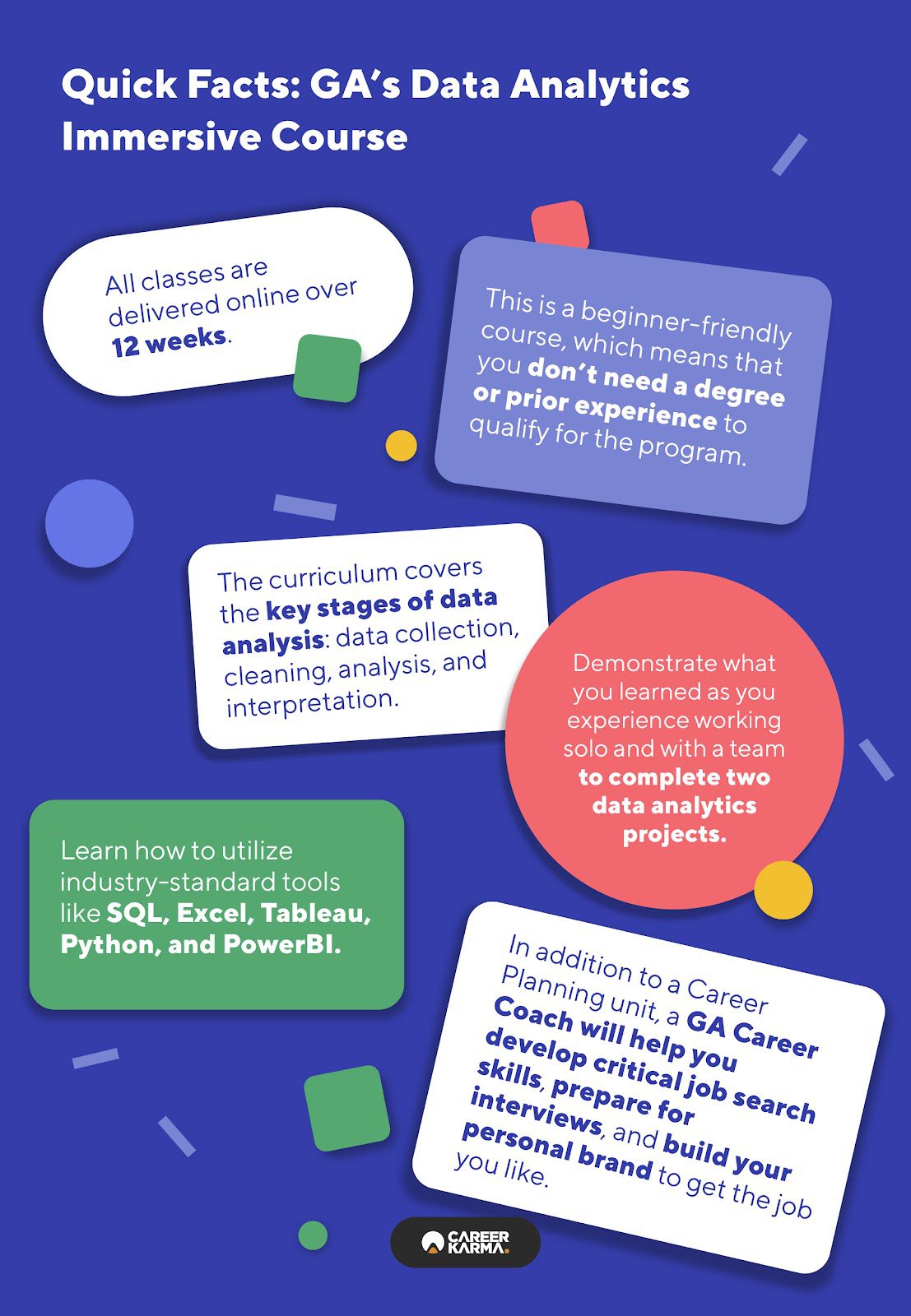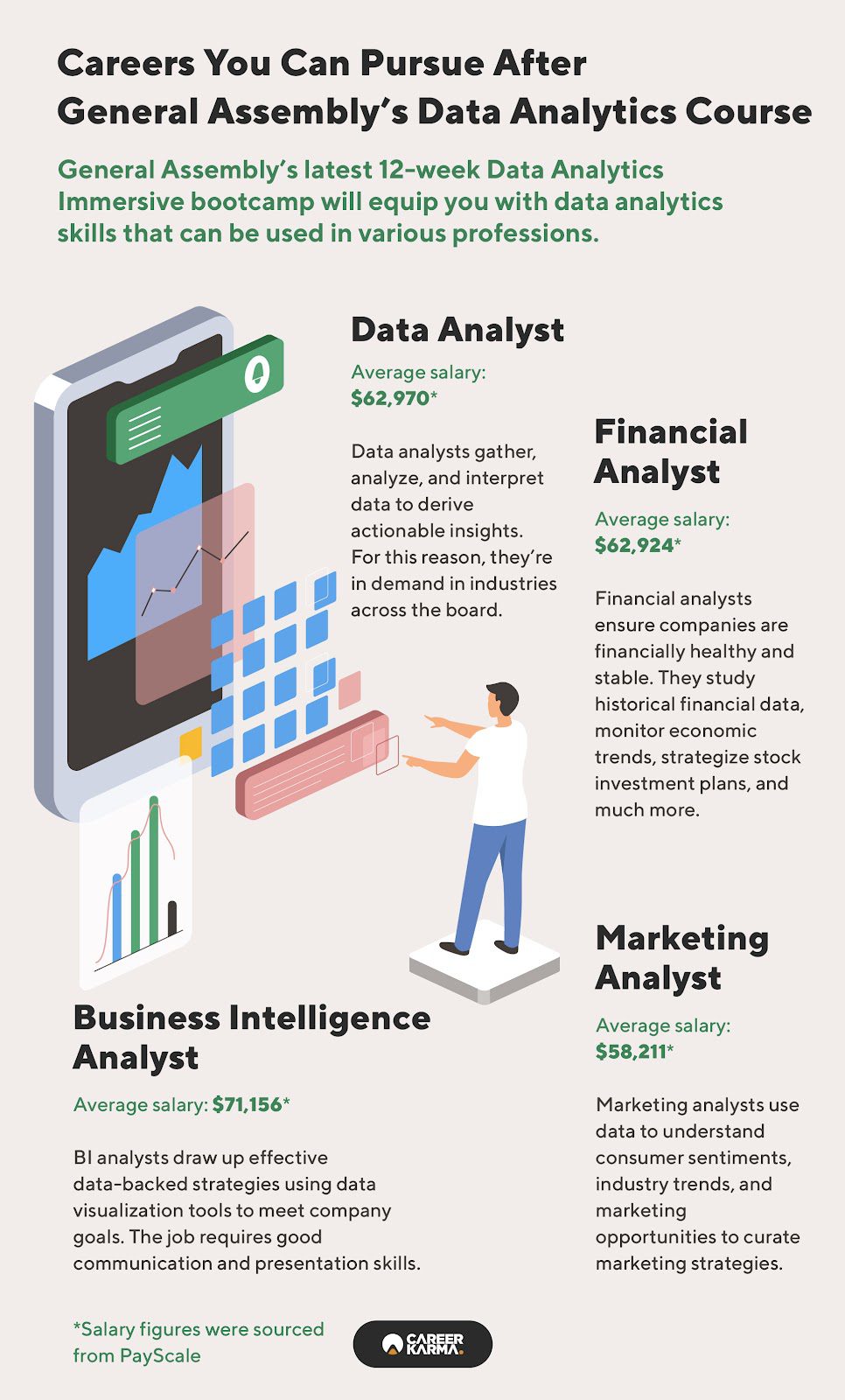Demand for data professionals continues to flourish with no signs of slowing down. Why? Because while data is all around us, it takes well-rounded experts, like data analysts, to harness data, unlock powerful insights, and drive business value. For this reason, data analytics presents numerous opportunities for professionals wanting to explore their tech potential.
One path that can help you get your foot in the door is General Assembly.
General Assembly is a pioneering online tech bootcamp with over a decade of presence in the edtech space. Until recently, the bootcamp offered courses in software engineering, data science, digital marketing, and UX design. In a bid to meet the rising market demand for data professionals, General Assembly has added a new beginner-friendly program to the mix: the Data Analytics Immersive.
With the latest addition of the Data Analytics Immersive course to its course lineup, General Assembly continues to open doors to growing tech careers.
Learn more about the course here.The best part is you will only need a high school diploma, GED, or the equivalent to qualify for the program. No degree or previous tech experience is required.
An Overview of General Assembly’s Data Analytics Course

General Assembly’s Data Analytics Immersive is a fully packed 12-week course designed to start your career in a data role using the latest data frameworks. The program splits into nine units, with Units 1 through 7 focusing on equipping you with the necessary data analyst skills and Units 8 and 9 on preparing you for job interviews.
Technical Training
To ensure unbiased and accurate data gathering and interpretation, General Assembly first instills an ethical mindset that will serve as your compass throughout your career. You learn how to gather information from reliable sources and explore data ethics and algorithmic bias. The course then delves into statistics and math, both of which form the backbone of data analysis.
As you build your foundation in data analysis, you’ll learn how to utilize the following data analytics tools:
- SQL. This programming language is used to store, prepare, clean, manipulate, and access data in a given database. SQL programming is a need-to-know skill for data analysts.
- Excel. Contrary to popular assumptions, Excel is not just for creating tables. Instead, you can use various Excel functions to consolidate and organize data for easier analysis.
- Tableau. A leading data visualization tool used for data analysis and business intelligence, Tableau informs strategic decisions across business units.
- PowerBI. This is a data visualization platform that can connect different data sources to build business intelligence insights.
- Python. Python helps with exploring trends or patterns in large data sets (data mining), collecting and translating data into actionable insights (data processing), and creating visual representations of data (data visualization).
Along with using these tools, data analysts are also responsible for effectively communicating your findings to stakeholders. So during the course, you will master the art of storytelling, simplifying complex data so even stakeholders who may not be familiar with the technical “data lingo” can understand your insights.
The process involves leveraging data visualization tools like Tableau and PowerBI to produce graphs and charts that can summarize your findings at a glance. When done right, stakeholders can devise strategies backed by reliable information.
Capstone Project
Unit 8 of the course is where you apply all the data analytics skills you acquired to solve real challenges organizations face. While this project-building unit serves as an ultimate test before you step into the real world, it also marks the beginning of your professional portfolio.
Career Planning
Career planning serves as the last leg of the Data Analytics course. You receive personalized job support designed to set you up for a smooth transition from the bootcamp to a data analytics job. General Assembly’s Career Coaches help you with the following:
- Preparing for job interviews
- Learning how to tackle technical tests
- Building your personal brand
At the end of the course, you will receive a certificate of completion, which you can add to your LinkedIn profile as well as recommended open roles that the General Assembly Coaches team has sourced from a network of over 19,000 hiring partners. What else can you do with your data analytics training? Below are four career paths you should consider after completing General Assembly’s Data Analytics course.
4 Data Analyst Career Paths to Choose From

1. Data Analyst
Data analysts have a multidirectional scope, from gathering and cleaning data to analyzing and interpreting them. Given the job’s versatility and market demand, a data analyst can work in various sectors. A data analytics job can also be your stepping stone to a more specialized career like data science.
According to PayScale, data analysts earn an average annual salary of $62,970. A quick search on job boards like LinkedIn revealed over 180,000 vacancies at any given time. Put another way, you will never run out of opportunities to grow in data analytics.
2. Financial Analyst
Have you ever wondered how companies effectively make financial decisions? Short answer: financial analysts. Business leaders rely on financial analysts when analyzing economic trends and allocating resources.
Their main goal is to keep the company financially healthy and stable by studying historical financial data and monitoring economic trends. They are also involved in strategizing a company’s stock investment plans, increasing return on equity and assets, and analyzing debt ratios.
Financial analysts are well-remunerated, earning around $62,924 a year. They are in demand in banking, insurance, and investment industries, to name a few.
3. Business Intelligence Analyst
Unlike data analysts who focus on the technical processing of data, business intelligence analysts or BI analysts are responsible for developing effective data-backed strategies to reach company goals.
Since BI analysts often engage with stakeholders, they must have a knack for presenting innovative and easy-to-understand solutions. In this designation, you will use data visualization tools—Tableau and Microsoft Power BI—more often than programming languages.
With what they can bring to the table, BI analysts in the US rake in about $71,156 annual salary. As you gain experience, this figure can increase up to $95,000.
4. Marketing Analyst
Many organizations are becoming increasingly aware of the value of marketing, which is next to the importance of brand presence among consumers. A report by Forbes stated that ad spending has increased by 22.7 percent and is expected to expand in the coming years.
With millions of dollars in marketing expenditure at stake, adding marketing analysts to a marketing team is imperative to ensure a high return on investment and optimum results.
Marketing analysts spend a lot of time understanding consumer sentiments. They are also responsible for identifying industry trends and marketing opportunities that can help propel marketing strategies.
According to PayScale, you can earn $58,211 per year, on average. The latest figures show that the demand for marketing analysts will grow by 22 percent, presenting you with huge career opportunities in the coming years.
The bottom line is that you can explore a range of careers as a data analytics graduate. You can even leverage your data analytics skills and become a double threat in your field, especially if you work as a project manager, a growth marketer, or an economist, among others.
Is General Assembly’s Online Data Analytics Course Worth It?
According to Ben Griffiths, a General Assembly DAI alumni, the course was a great starting point for beginners like him. More than the technical training in the bootcamp, the end-to-end career support from the team gave him the confidence he needed to break into a new field.
Caroline Ayuki, another DAI alumni, credited General Assembly’s team of instructors for helping her realize her full potential in data analytics. She appreciated the fact that she was able to learn from the experts with the bootcamp ensuring that students get high-quality training. Given their careful guidance, Caroline felt that the course was highly accessible to different levels of learners.
After graduation, Ben secured a job as a data analyst for a management consultancy agency. At the same time, Caroline landed a job as a business intelligence analyst for a leading graphics design platform based in Australia.
So, what are you waiting for? Go on and seize the opportunity to launch your career in data analytics. Join the next cohort of General Assembly’s Data Analytics Immersive!
About us: Career Karma is a platform designed to help job seekers find, research, and connect with job training programs to advance their careers. Learn about the CK publication.




